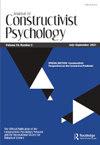文化认同、意义寻找与生活满意度:集体主义的调节作用
IF 0.7
4区 心理学
Q3 PSYCHOLOGY, CLINICAL
引用次数: 0
摘要
摘要本研究旨在厘清集体主义文化背景下意义寻找与生活满意度之间的混合相关性,并探讨其可能的机制。假设文化认同可以预测更大的意义寻找,而意义寻找对生活满意度的影响可能会被个人层面的集体主义所调节。通过横断面设计(研究1)和纵向设计(研究2)对这些假设进行了检验。研究1 (n = 954)显示,文化认同与更高的意义搜索相关,更高的意义搜索与更高的生活满意度相关;集体主义缓和了后一种联系。研究2 (n = 158)测试了两种类型的意义搜索:建设性意义搜索和反刍意义搜索。半纵向中介分析结果显示,T1文化认同正向预测T2建设性意义搜索,T1建设性意义搜索正向预测T2生活满意度;这些结果并不适用于反刍意义搜索。适度分析再次证明了集体主义的适度作用。因此,在低集体主义的参与者中,意义寻找与生活满意度之间存在正相关关系,而在高集体主义的参与者中则没有。这项研究呼应了测试无障碍文化心态的呼吁,并强调了这样做的必要性。关键词:意义搜索文化认同集体主义生活满意度披露声明作者无相关经济或非经济利益需要披露。数据可用性声明支持本研究结果的数据可应要求从通讯作者处获得。本研究得到重庆市自然科学基金[资助号:CSTB2022NSCQ-MSX1012]和国家社会科学基金[资助号:19BSH128]的支持。本文章由计算机程序翻译,如有差异,请以英文原文为准。
Cultural Identity, Meaning Search, and Life Satisfaction: Collectivism as a Moderator
AbstractThis study sought to clarify the mixed correlations between meaning search and life satisfaction observed among participants from collectivist cultures and to explore the possible underlying mechanisms. It was hypothesized that cultural identity may predict greater meaning search, and the effect of meaning search on life satisfaction may be moderated by individual-level collectivism. These hypotheses were tested with a cross-sectional design (Study 1) and a longitudinal design (Study 2). Study 1 (n = 954) revealed that cultural identity was associated with higher meaning search, and higher meaning search was associated with greater life satisfaction; collectivism moderated the latter association. Study 2 (n = 158) tested two types of meaning search: constructive meaning search and ruminative meaning search. Results from the half-longitudinal mediation analyses showed that T1 cultural identity positively predicted T2 constructive meaning search, and T1 constructive meaning search positively predicted T2 life satisfaction; these results did not hold for ruminative meaning search. Moderation analyses, again, demonstrated a moderating role of collectivism. As such, the positive relationship between meaning search and life satisfaction was held among participants with low collectivism, but not among those with high collectivism. This research echoes the call for testing accessible cultural mindsets and highlights the necessity of doing so.Keywords: Meaning searchcultural identitycollectivismlife satisfaction Disclosure statementThe authors have no relevant financial or non-financial interests to disclose.Data availability statementThe data that support the findings of this study are available from the corresponding author upon request.Additional informationFundingThis work was supported by the Natural Science Foundation of Chongqing, China [Grant number: CSTB2022NSCQ-MSX1012] and the National Social Science Fund of China [Grant number: 19BSH128].
求助全文
通过发布文献求助,成功后即可免费获取论文全文。
去求助
来源期刊

Journal of Constructivist Psychology
PSYCHOLOGY, CLINICAL-
CiteScore
2.40
自引率
0.00%
发文量
22
期刊介绍:
Psychology and related disciplines throughout the human sciences and humanities have been revolutionized by a postmodern emphasis on the role of language, human systems, and personal knowledge in the construction of social realities. The Journal of Constructivist Psychology is the first publication to provide a professional forum for this emerging focus, embracing such diverse expressions of constructivism as personal construct theory, constructivist marriage and family therapy, structural-developmental and language-based approaches to psychology, and narrative psychology.
 求助内容:
求助内容: 应助结果提醒方式:
应助结果提醒方式:


